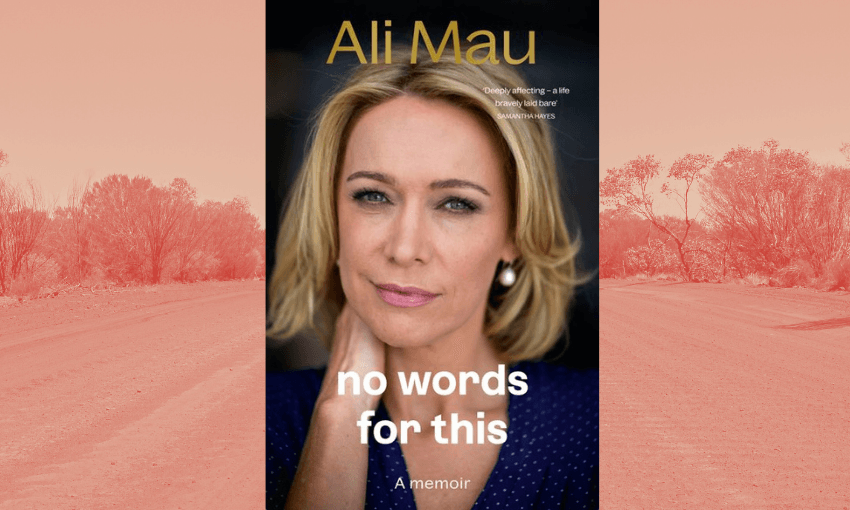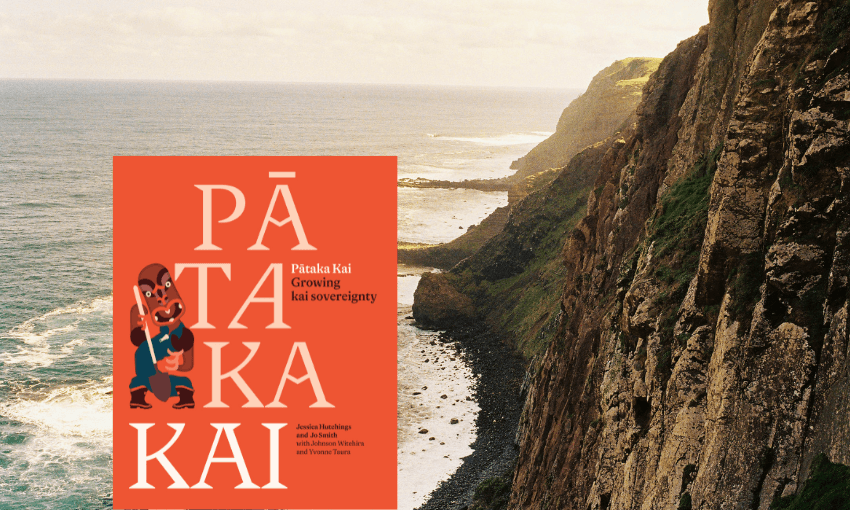Claire Mabey and Alex Casey discuss Ali Mau’s memoir, No Words for This, which is released today.
This review discusses sexual abuse and includes details from throughout the book, including new information.
Claire Mabey: Alex, we’ve both read No Words for This by Ali Mau – I’d love to start by asking you for your overall impression of the book as a reading experience?
Alex Casey: Claire, there are so many things in this world demanding that one puts a book down as soon as one picks a book up. I hoovered No Words for This up over a weekend, proper late nights with my bedside lamp tilted downwards so as to not wake up my husband type stuff. It should probably come as no surprise, given that her career is built on words, but Mau reveals new depths to her writing talent here. She paints vivid scenes of acid-green tree frogs stuck to windows at a horsey homestead, but then just as easily will pull the rug out from under you with the single most shocking and stark family revelation you can possibly imagine. I gasped, out loud, multiple times.
CM: I also couldn’t put this book down. And it’s haunted me since I finished it. To set it up a bit for readers: the book starts off with a prologue that indicates that this memoir is going to delve into family secrets, but you don’t know from the start just how devastating those secrets will be.
Mau begins with her childhood and runs through chronologically from there, but there is a foreboding throughout which comes to fruition in the later chapters, as a story of abuse surfaces. Which is where we need to say to readers – please take care because a major component of Mau’s story is that she is a survivor of sexual abuse perpetrated by her father. The book shows how complex it is to navigate trauma when multiple parts of a person have to be at work at once. For example, there is a scene where Mau describes that while her ageing mother is ill and in hospital her father tries to extract forgiveness from her: the deft writing shows how Mau’s daughter-of-ageing-mother-self, survivor-self, and journalist-self are all having to negotiate the situation all at the same time.
The memoir compartmentalises the abuse storyline by using pages in a different font and with a grey background – almost like files – a structure that shows how profound the experience is for Mau and her family, and how hard it is to weave into the story of her life at large.
But many people will come to this memoir because they know Mau from the TV. As someone who has spoken with Mau before, Alex, did you find what you expected in the book in terms of her career as a journalist and a leading voice in reporting cases of abuse and the voices of survivors?
AC: Even before we got to the #MeTooNZ part of the book, I was really impressed with Mau’s frankness around how being a journalist can be really fucking hard work. That expectation of the old-fashioned hard-nosed, cut-throat emotionless reporter (embodied in her own father) is a really harmful one, and every time a journalist says “this was a really hard story and I cried a lot afterwards” it lifts a tremendous weight off all our shoulders and allows us all to be a bit more human. She talks about being in Christchurch immediately after the earthquakes and sobbing while walking through the red zone sludge back to the TVNZ car: “I morphed between being a journalist and a human being in those few days,” she writes. “In the aftermath, a new set of beliefs about my craft and its potential for good had formed.”
Knowing this hero origin story, getting to #MeTooNZ also contained heaps of crucial process details that I’m so glad have been laid bare publicly. People don’t see the hours of invisible pastoral care that go into writing these investigations, or the tense and expensive legal back and forths and bone-chilling defamation letters. They also definitely wouldn’t know the levels of vitriol and abuse that can get silently absorbed in the process. I had completely forgotten about that godawful witch hunt cartoon which was published after Mau announced the project, and the panic from certain male commentators that every man and his dog was suddenly going to be front page news for wolf-whistling. I’d like to say we’ve moved on as a society by now, but I truly shudder to think what launching a project like that would look like in 2025.
CM: I found Mau’s whole career a troubling account of a woman in the media who has had to weather stunning amounts of misogyny just to do her job. Mau describes her first jobs in Australia which came with chauvinistic bosses demanding she ask a female athlete about a boob job, and harassing women reporters about their clothing choices. And Mau always comes back to her journalist father and his arrogance and bullying. Mau has come through so much it really is devastating that in 2025 we can’t be confident that conditions are any safer.
One media moment in the book that stood out for me was in 2010 when Mau was asked to fill in for Paul Henry on TVNZ’s Breakfast show. It was the first time two women (Pippa Wetzel was Henry’s co-host at the time) were fronting the show. Mau describes how she’d just been subject to The Edge’s Dom Harvey’s derogatory rap song about her (to the tune of Single Ladies by Beyoncé) and paparazzi scooping photos of her that were published in Women’s Day. Mau decided to use the spot on Breakfast to ask when it all was going to stop. She describes how she talked for three minutes, which she explains is a long time in TV, and how she was “shaking with fear and exhilaration”.
AC: I also really loved that part where she had her Network moment on Breakfast too! She’s mad as hell and she’s not going to take it any more! It was also just one of the many excellent examples in the book where Mau, in both her personal and professional life, still somehow managed to be so controlled and gracious in a situation where she had every right to scream at the top of her lungs and throw some furniture around. But also, at the risk of sounding like the very same gossip columnist scum who hid in the bushes and set up camp on her doorstep, I have to admit that I also relished in reading about her and Simon Dallow’s meet-cute on a Contiki, and her eventually stalking him down by using the phone book (!!) and leaving a message with his flatmate (“almost certainly his wife, I thought in panic”).
CM: I’m also scummy because I enjoyed that part and the nostalgia that came with reading about travel back then: Contiki surely must have facilitated many, many relationships. In the book Mau describes her marriage to Dallow like this: “I think of my marriage to Simon like a superyacht: sleek and gleaming, every stainless cleat polished, every rope tidily coiled. A casual observer, lacing their boat shoes on the dock, might look up and think, Now there’s a handsome vessel! Must be a good time aboard that beauty! Even the water this ship sits upon is calm, nary a ripple bothering its shining surface. But below the waterline, unseen, there is a breach, a hole too tiny to notice.”
Mau doesn’t go into great detail into her and Dallow’s separation but it’s extraordinary to read how their private and working lives were so entwined and how they had to disentangle so publicly (they co-presented One News from 1999–2003). The refrain that really got me though, in terms of Mau’s career (which from the outside could also be described as a shiny yacht) is the fact that she has been fired five times from various media roles. It was sobering to read such volatility in 2025 when the media feels more fragile than ever. And in light of that, truly impressive to read how Mau persevered and went on to make a huge difference to what journalism has been able to do in Aotearoa. I found myself cheering when she described winning Reporter of the Year at the Voyager Media Awards in 2021.
AC: I also respected how she gives credit where credit is due, but also isn’t afraid to name people and organisations in the industry who have let her down. In one instance, Mau talks about getting a flurry of interview requests following Rebel Wilson’s outing by the Sydney Morning Herald, with many local journalists drawing parallels with the women’s mags outing her in the early days of her relationship with Karleen. She talks about the stress of having that chapter in her life all brought up again, and how it feels to be on the other end of media inquiries when you don’t get a follow-up or update, or any of that same sort of care she gave to so many. Definitely cause for reflection and a reminder, as in so many parts of this book, that just because someone is famous it doesn’t make them less of a human being.
CM: Maybe we need to point out that the memoir isn’t all bleak despite the challenging aspects of Mau’s life. There’s a real energy throughout the book and Mau’s many adventures. The descriptions of falling in love with Karleen are beautiful, as is their separation, and eventual reuniting thanks to Covid (they formed a bubble and that enabled them to get closer again in a way that Mau describes as an even deeper love that surprised her).
One passage I loved the most was when young, horse-mad Mau is taken to the outback for a whole summer to ride horses with her cousins. She describes wild days of riding, and adventuring and freedom. It’s truly magical to read: you get a sense of the young girl discovering a whole alternative way of life that is far away from the oppressive presence of her father, and the sadness of her mother (we learn very early in the book that Mau’s mother wanted to return to England and leave their father, and tried, but was told to get back on the boat to Australia by her own mother).
AC: And without spoiling it too much (can you spoil a memoir?) there’s a beautiful parallel to be found as Mau eventually finds her cosy nest on the West Coast, with a pony of her own and the love of her life, after weathering many, many storms.
CM: That’s a lovely place to leave Ali Mau. One last question for the readers: would you recommend this memoir?
AC: We’re writing this on a Monday morning and I don’t have the words right now to quite sum up just how gripping, revelatory, generous and layered this book is. So I’ll just say this: yes.
No Words for This by Ali Mau ($40, HarperCollins NZ) is available to purchase from Unity Books.


